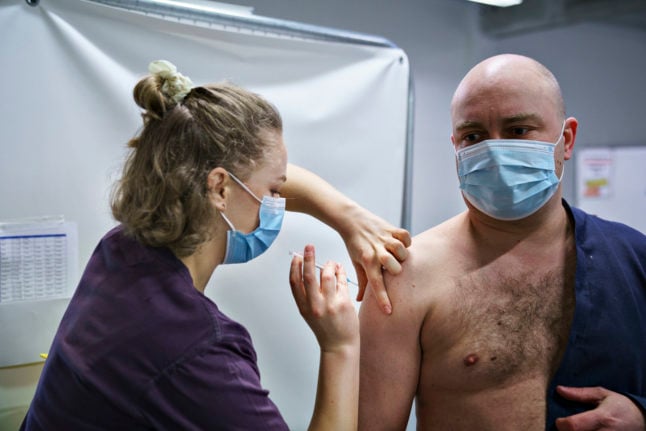In the early hours of Thursday morning, Denmark’s government agreed what might be its final reopening deal with all but one of the parliament’s political parties (the New Right Party was not involved).
Here’s what the timetable looks like:
June 11th:
From this Friday, the regulations on nightlife will change to give everyone an extra hour in pubs, with the sales of alcohol now allowed at midnight, rather than 11pm. The new 12pm limit for alcohol sales will also apply to supermarkets and other shops which sell alcohol.
On Friday, the maximum number of people allowed to partake in indoor gatherings also increases to 100.
June 12th:
The number of spectators allowed at Parken football stadium has been increased from 15,900 to 25,000, but the Danish Football Association told the TV2 broadcaster that it was not ready to host 25,000 fans when Denmark plays Finland in Copenhagen on Saturday.
June 14th:
From Monday morning, face masks will no longer be required apart from when standing on public transport, and when entering or leaving carriages or buses.
From June 14th, there will also no longer be a requirement to wear a face mask in taxis, at stations, or on train platforms.
However, at a press conference on Thursday, the director of the Danish Health Authority, Søren Brostrøm said that masks were still recommended for anyone who:
- enters the public sphere when they are ill
- has coronavirus symptoms
- knows they are infected with coronavirus
- has been in close contact with an infected person
- is in self-isolation and need to see a doctor or get tested
A coronavirus passport will no longer be required to enter public libraries, when doing activities linked to voluntary organisations or clubs, at evening classes, or for those taking classes under the Folkeuniversitetet adult education system.
Kindergartens, primary schools, after-school clubs, and centres for youth and adult education will be allowed to return to a normal timetable.
Schools and kindergratens may also be able to do away with many of the hygiene and distancing routines they have followed since April last year. Although the details have yet to be published by Denmark’s education ministry, some of the precautions likely to be dropped include:
- the need for parents to wear face masks when they drop off or pick up their children at school or kindergarten
- the ban on parents entering the main rooms in kindergartens
- the ban on children playing with other children from different divisions of a kindergarten
- the extra cleaning and disinfection of toys brought in last April
Staff at kindergartens and primary schools who wish to wear a protective visor will continue to have the right to do so, Denmark’s ministry of education said in a press release on Friday.
July 1st:
In three weeks’ time, restaurants where customers “essentially sit down” will no longer need to be able to provide two square metres of space per customer or ensure a two-metre gap between each different party of customers.
The maximum number of people allowed to partake in indoor gatherings will also increase to 250.
July 15th:
From the middle of July, bars and restaurants will be able to stay open until 2am. Restrictions on the sale of alcohol will also be relaxed further.
August 1st.
From the start of August, a valid coronavirus pass will no longer be needed for:
- events with fewer than 2,000 spectators
- casinos, theatres, and cinemas with fewer than 500 spectators.
- museums
- amusement parks
- zoos
- ondoor sports activities
- markets
- fairs and animal shows
- conferences and business meetings
- outdoor sports events, including football matches
A coronavirus pass will still be needed to attend gyms and fitness centres, however, but the guidelines may be changed so that gym operators only have to make daily spot checks on customers, rather than check every single visitor.
According to a press release issued on Friday June 11th by Denmark’s education ministry, the requirement to have a valid coronavirus test to attend classes at youth and adult education centres, and at “efterskole” — the unique voluntary boarding schools where Danish young men and women can study predominantly cultural subjects.
As every efterskole is residential, however, it will still be strong encouraged to get tested.
September 1st:
From September 1st, nightclubs and discos will be able reopen for those carrying a valid coronavirus pass, with some of them opening their doors for the first time since March 2020.
Visitors to gyms and fitness centres will no longer need to show a valid coronavirus pass.
It will no longer be required to wear a face mask even when standing on public transport, or when entering or leaving carriages or buses.
Employees at kindergartens will no longer be recommended to get tested regularly, apart from those who have not been vaccinated.
October 1st:
By October 1st, the recommendation to get tested will no longer apply to primary and secondary schools, and a coronavirus pass will no longer be required anywhere in Denmark, even for nightclubs and discos, meaning the last remaining coronavirus restriction will be lifted.



 Please whitelist us to continue reading.
Please whitelist us to continue reading.
What about international restrictions? How can the country still be closed to visitors and full on parties are allowed?